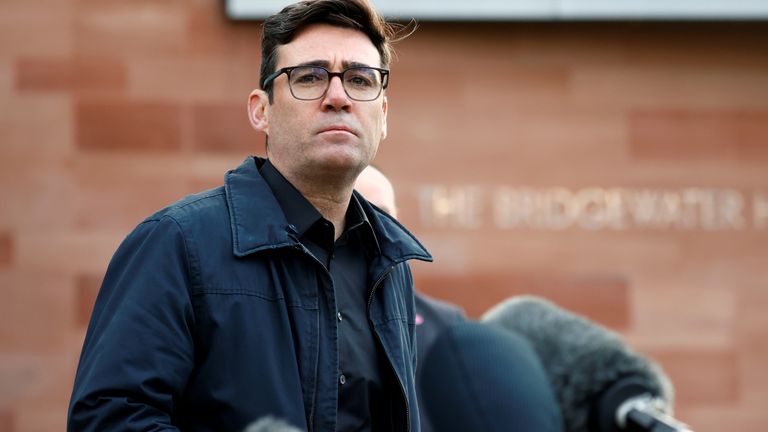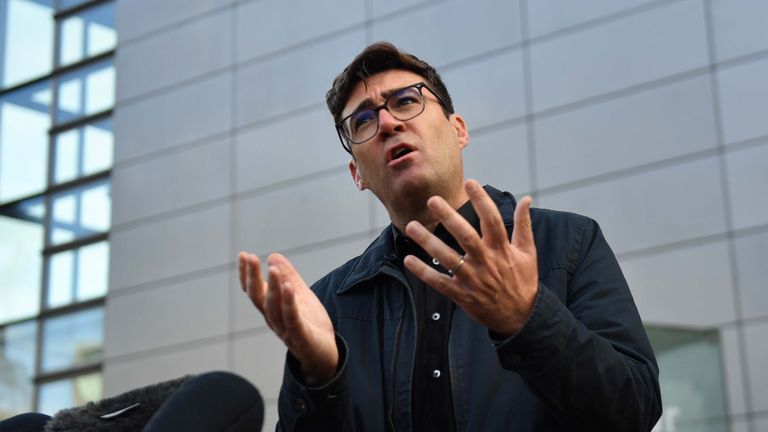It was 13 December, the morning after Boris Johnson won a landslide victory and destroyed Labour’s Red Wall.
The new prime minister stood on the steps of Number 10 and declared his “One Nation” government had won over parts of the country that had “never returned a Conservative MP for 100 years”.
He promised to level up the country and repay the voters who delivered him that 80-seat majority.
But 10 months later, standing in the centre of Manchester on Tuesday afternoon, the Labour metro mayor Andy Burnham offered this blistering riposte to those promises as he gave his version of why talks had collapsed over a financial deal for an impending local lockdown.
“What we’ve seen today is a deliberate a of levelling down,” said Mr Burnham, who failed to agree a financial support package for 2.8 million people about to be put into an even stricter lockdown on Friday.
“I don’t believe we can proceed through this pandemic by grinding people down. We need to carry them with us, not crush their spirit.”
If we were all in it together in the first lockdown, the regional approach is driving us ever more apart, exacerbating the north-south divide and old grievances between the government in Westminster and communities that feel ignored.
This is partly about the policy.
The government, desperately trying to tread that fine line between protecting public health and keeping the economy going, is carving up England into different tiers, trying to keep the economy in say East Anglia or Cornwall open, while Liverpool, Lancashire and Manchester have to shut down.
It will inevitably create tensions as COVID policy becomes more nuanced, complicated and contested.
But these divisions are also being exacerbated by the politics of negotiating on a deal-by-deal basis with no framework or agreed goals. Central government holds the purse strings and all the cards.
“It’s grim,” said one regional leader as the Greater Manchester talks collapsed on Tuesday. “When did the government change from ‘we’ll do whatever it takes’ to ‘accept whatever we give you?’
“It’s massive turnaround since the start of the year, when they were asking people to do really hard things. They are trying to take regional action on the cheap.”
And it is fuelling division and discord. In Liverpool last week, local people hit by the most severe restrictions told me they believed it was because the Tories couldn’t win Liverpool’s votes, so didn’t care about their fate.
In Manchester, those toiling under Tier 2 restrictions for nearly 12 weeks were worn down.
When the capital and the rest of the country locked down in March, the support packages seemed boundless, yet when it’s the North that’s hit hardest by the second wave, that level of support is not there.
From the government’s perspective, it went as far as it could. This local plan had a read-across to other deals being negotiated. Mr Burnham had asked for £90m to support workers and businesses laid up because of the new restrictions, before settling on £65m as the very minimum he could accept.
But for the prime minister, it was £5m too much. He was adamant in the call with Mr Burnham that he couldn’t go above £60m because he couldn’t be seen to give Greater Manchester a better settlement than other deals handed out over the past week.
“We want to do more, but for the sake of fairness, the deal has to be in line with agreements reached with Lancashire and Merseyside,” was how Mr Johnson put it as he announced his decision to impose the strictest lockdown in Greater Manchester from midday on Friday, at a news conference soon after talks collapsed.
But the prime minister sowed confusion, too, as he refused five times to verbally honour his commitment to give £60m to workers and business – saying instead this was a matter of negotiation as he invited Mr Burnham back for talks.
The money might then be there – but Mr Burnham has to capitulate and accept the final offer from Number 10.
Amid the political wrangling, 2.8 million people face tighter restrictions at the end of the week and are still no wiser as to what extra support they might get.
Jonathan Ashworth, the shadow health secretary, voiced the sentiment of those Labour MPs representing people in the region when he called the government’s behaviour “petty, vindictive, callous”.
“The prime minister may think he’s punishing the politicians. In fact, he’s punishing the people of Greater Manchester,” he said.
The government was trying to untangle the web on Tuesday night, with Mr Hancock confirming in the House of Commons that the £60m was still on the table as he invited local leaders to work with the government.
But how much damage has been done? This was the Conservative Party that “won” parts of the North just 10 months ago, now being denounced in the centre of Manchester for leaving one of the heart cities of the North and its people behind.
“We are struggling,” Mr Burnham told the cameras and the impromptu crowd that had gathered. “This pandemic has hit the North harder than it has other places because of the entrenched poverty in the north of England, because Westminster has neglected the north of England for too many years.”
Locking down different parts of the country was a policy that was always going to create divisions and sow discord. That is why the politics of the negotiations were so critical.
A framework for deciding not just how regions moved in and out of tiers, but the financial support package that would be put into place, would have perhaps taken some of the pure politics out of the negotiations.
As it is, the politics of the deals have deeply undermined the policy – and that has implications for public health.
It has implications too for Boris Johnson and his new band of “Red Tories”.
They call Andy Burnham the “King of the North” now. It was the crown Mr Johnson believed he had won in that general election.





